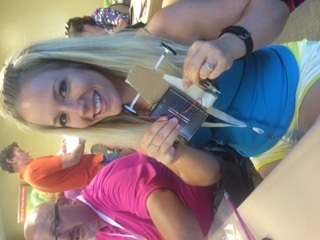ARLINGTON – Rachel Harrington used to teach literacy, and when she was laid off and found out the only position she could have was science she “cried and cried.”
“I hated science in school,” she said, adding her teachers just taught out of a book. “Now I love it. I have a passion for it.”
She tries to instill that same passion with her students at Haller Middle School with a hands-on teaching technique.
Harrington turned her mindset around about science.
“We are never, ever done learning,” she said. “We’re never done exploring, discovering and growing.”
Harrington has continued to learn the past two summers by attending a Green Boot Camp in San Diego this year, and a NASA camp last summer. She won scholarships from Honeywell both times, being among the 50 selected from 900 applicants from 12 countries. She was placed with a team of five teachers from all over the world.
She said the biggest thing she took back from the camp was to allow students to “Discover your learning.”
Harrington said she has changed her teaching to do just that. She talks to students about concepts for a few days, then gives them the materials and the end goal. She is there to guide them, but not give them the answers. If they fail, they keep trying, learning from their mistakes.
“Trial and error,” she said. “The kids love it.”
She admitted sixth-graders can get a little intimidated at first coming from grade school with no background in inquiry-based science.
“I have to solve this on my own?” they often say to her.
But after a few months it often becomes their favorite class, she said.
One of the most-interesting ideas to come out of a class had to do with colonizing Mars. The students had the idea of building walls made of human feces to protect the colonists from Mars’ radiation.
“It’s gross but it works,” Harrington said. “I’ve never seen so much engagement.”
With that buy in from students, “Test scores skyrocketed,” said Harrington, who graduated from Western Washington University and has worked only for Arlington for nine years.
Harrington has other hands-on experiments:
•Making rockets out of balloons and going from the floor to ceiling lifting paper clips.
•Engineering a chariot that can carry a load.
•Building a water wheel or wind turbine to “manufacture energy in a green way.”
A race with their inventions always goes well.
“Kids love any kind of competition,” she said.
Harrington recommends that more teachers attend summer camps.
“Far too often they’re secluded within their four walls,” she said. “Teachers get fixated on coaching students where they want them to go.” With inquiry-based learning, the students figure it out. “Hands-on is the most incredible learning,” she said.



